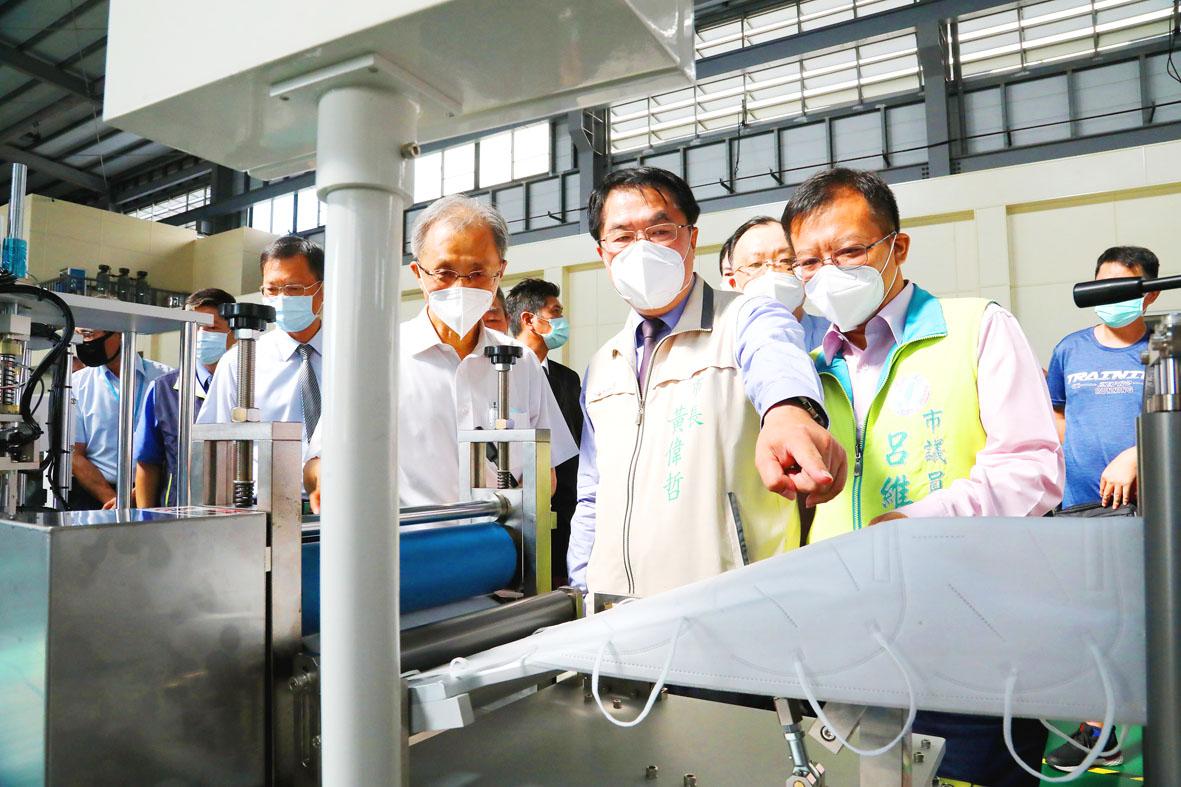The government would withdraw from a firm’s plan to “donate” mask production lines to the Czech Republic if it involves the Taiwanese company making a profit, the Ministry of Foreign Affairs said yesterday, while announcing that the ministry would also donate a mask production line to Prague through government channels.
The Central News Agency (CNA) on Sunday reported that Tainan-based automatic device manufacturer Autoland Technology Co (東建安) was set to realize its promise to Czech Senate President Milos Vystrcil to donate five automated mask production lines to the European nation, a promise it made in September to thank Vystrcil for visiting Taiwan.
Due to political and legal issues, the company was planning to donate four lines to Czech businesses and a fifth to the Czech government, although the government-to-government route might not be workable, CNA said.

Photo courtesy of Tainan City Government
However, the “donation” is being overshadowed by the questions about whether it would involve Autoland making a profit and how the recipients of the lines were picked.
Ministry spokeswoman Joanne Ou (歐江安) at a news briefing in Taipei said that Autoland initially planned to donate five mask production lines to the Czech government, but it has since opted to donate four lines to Czech businesses.
If such a donation was made to the Czech government, the ministry would be glad to see it happen, Ou said, adding that if the donation were made to Czech businesses and involved Autoland making a profit, neither the Taiwanese nor Czech governments would be involved.
“If it is a charitable donation, it should be free of profit-making; if it is a business transaction, the company should follow the regulations in the recipient nation,” she said.
The government plans to donate a mask production line to the Czech government, Ou said, adding that the ministry would provide further information when the details of the donation had been agreed.
The government’s donation is for humanitarian reasons and would be made through its own channels without involving the company, she said.
Autoland general manager Kuo Li-lin (郭立霖) said via telephone that the company’s donation does not involve any commercial profit, but there are some tax issues to be tackled.
The government had promised to help with air freight costs, but now the company would pay for the shipment itself, he said.
Autoland could not make the donation to the Czech government because Czech Prime Minister Andrej Babis said it would not accept donations from Taiwan, he added.
The recipient of the company’s donation would be the European Centralised Virtual Vehicle Register, an enterprise cofounded by Czech materials supplier InoCure and mask producer Good Mask, Kuo said, adding that 5 percent of the masks produced would be donated to the Czech Senate for distribution to state medical facilities.
The Czech-Taiwanese Business Chamber helped to select the recipients, after Autoland required that the recipients be friendly to Taiwan, familiar with mask production and able to visit Taiwan for technical training, he said.

Beijing could eventually see a full amphibious invasion of Taiwan as the only "prudent" way to bring about unification, the US Department of Defense said in a newly released annual report to Congress. The Pentagon's "Annual Report to Congress: Military and Security Developments Involving the People's Republic of China 2025," was in many ways similar to last year’s report but reorganized the analysis of the options China has to take over Taiwan. Generally, according to the report, Chinese leaders view the People's Liberation Army's (PLA) capabilities for a Taiwan campaign as improving, but they remain uncertain about its readiness to successfully seize

Taiwan is getting a day off on Christmas for the first time in 25 years. The change comes after opposition parties passed a law earlier this year to add or restore five public holidays, including Constitution Day, which falls on today, Dec. 25. The day marks the 1947 adoption of the constitution of the Republic of China, as the government in Taipei is formally known. Back then the Chinese Nationalist Party (KMT) governed China from Nanjing. When the KMT, now an opposition party in Taiwan, passed the legislation on holidays, it said that they would help “commemorate the history of national development.” That

Taiwan has overtaken South Korea this year in per capita income for the first time in 23 years, IMF data showed. Per capita income is a nation’s GDP divided by the total population, used to compare average wealth levels across countries. Taiwan also beat Japan this year on per capita income, after surpassing it for the first time last year, US magazine Newsweek reported yesterday. Across Asia, Taiwan ranked fourth for per capita income at US$37,827 this year due to sustained economic growth, the report said. In the top three spots were Singapore, Macau and Hong Kong, it said. South

HORROR STORIES: One victim recounted not realizing they had been stabbed and seeing people bleeding, while another recalled breaking down in tears after fleeing A man on Friday died after he tried to fight the knife-wielding suspect who went on a stabbing spree near two of Taipei’s busiest metro stations, Taipei Mayor Chiang Wan-an (蔣萬安) said. The 57-year-old man, identified by his family name, Yu (余), encountered the suspect at Exit M7 of Taipei Main Station and immediately tried to stop him, but was fatally wounded and later died, Chiang said, calling the incident “heartbreaking.” Yu’s family would receive at least NT$5 million (US$158,584) in compensation through the Taipei Rapid Transit Corp’s (TRTC) insurance coverage, he said after convening an emergency security response meeting yesterday morning. National